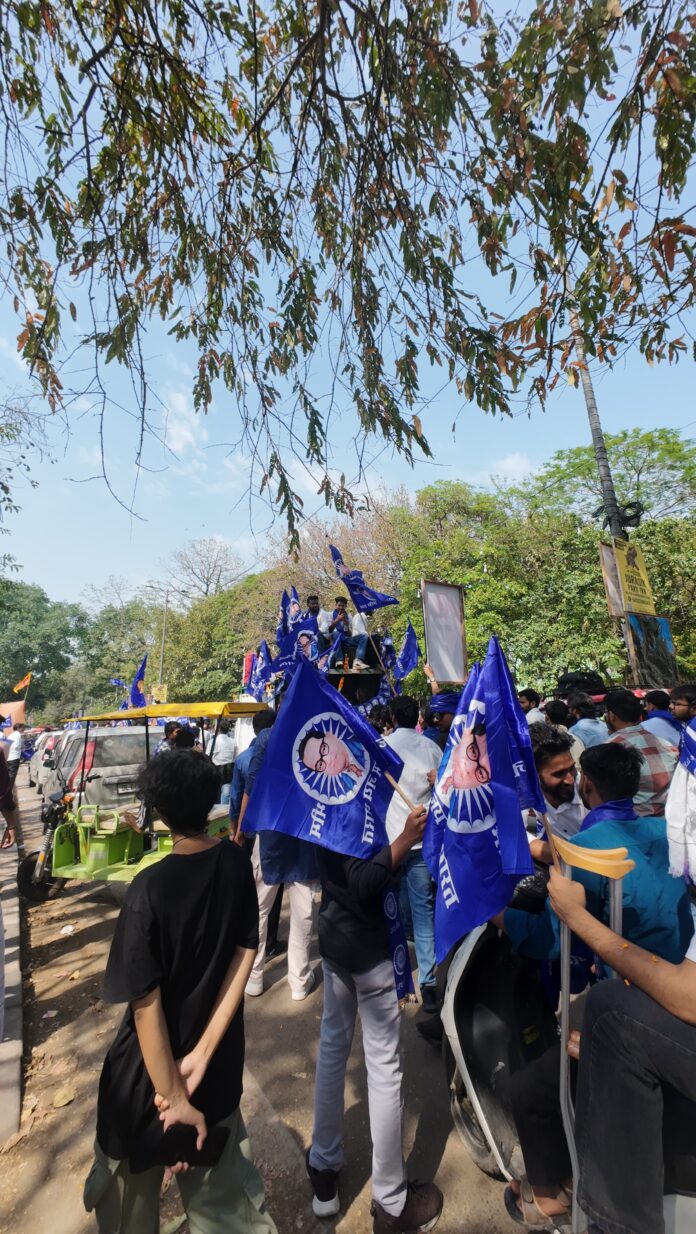On 11th April Bahujan students of University of Delhi celebrated Birth anniversaries of Jyotiba Phule and commemorated Babasaheb Ambedkar initiating celebrations for his Birth anniversary the celebrations were followed by a Shobha Yatra (glory march) on 12th April honoring the legacy of Babasaheb Ambedkar. The march began from Hansraj College and reached university Gate number 4. It seemed that the land under the shackles of hegemonic ideology of Brahmanism and communal state agenda is treated with the antidote of equality and fraternity. The public streets including campus have been like desert to Bahujan where they lack the fair opportunities for assertion of their dignity and legacy. However, the desert transformed into a blue ocean when the oppressed took over streets and claimed public space.
Students raised slogans in the name of Ambedkar, Phule, Savitri, Kanshiram, Mandal and Lohiya. These efforts to create an alternative sensory experience must be seen as to create a sense of belonging, a sort of counter culture of resistance, of political voice, of human dignity. It was during anti-reservation protests against the Mandal Commission report in 1990 that Savarnas complained about the affirmative action policy for backward classes at the university square near Ramjas college. It was an absence of organised mass and lack of articulation that dominant communities established the ‘merit myth’ againstsocial justice. However, contemporary campus echoed with slogans like “toot kamandal jaenge jb firse mandal aenge” (sacred pot shall break when mandal would return) referring to the challenges that social justice poses to communal brahmanic agenda. When students raised slogans for Savitri and Phoolan devi in campuses they strengthened their voice against Brahmanical patriarchy and atrocities against marginalized women by priestly and feudal communities.
Ambedkarite Reclaiming of space
Public spaces in India are often made through labour of marginalized groups but seldom have they got chances to imbue meanings for themselves. The oppressed masses of this nation are always on streets serving people trying to negotiate with public morality enforced by Brahmanical ideology. The public spaces have proved to be oppressive to Bahujan, it invokes an anxiety among them. Public spaces have been sexual to women, communal to minorities and casteist & exclusionary to Dalit-Adivasis. Hence, for Bahujan the public spaces remind them of oppression embedded in structures rather than places to feel equality and freedom. Public spaces often dictated by social attitudes of caste, class and patriarchy regulate marginalized categories, workers and women. The people seek to create alternative discourse, a new language of assertion and new vocabulary for rights and hence produce the public spaces as sites of resistance. Now when the oppressed-Bahujan of this nation have acquired the education, they seek to rewrite this public memory with Ambedkarite assertion and reclaiming of public spaces. The Ambedkarite assertion must not be seen as mere spatial politics rather a spatial challenge to systemic oppression on the lines of caste, class and patriarchy.
Alternative public memory
The most profound public memory around Ambedkar has been his statues in almost every city. Though these statues remain passive on most days, Ambedkar keeps speaking to his people in libraries. Every year Ambedkarites make an effort to bring him from books to road, celebrating him, his legacies, for their self respect and dignity. People feel gratitude towards him, they thank him for his efforts. The public memory in the form of shared knowledge and information held by Bahujan is tied to collective identity, history, trauma, struggle & celebration. Oppressed mass is silenced and often made to forget their history and people. It is due symbolic domination of Brahmanism that Bahujans misrecognise their history, philosophy and values. Over a long period of domination they have been alienated from knowledge even their indigenous cultural forms were taken away or appropriated by domination. Whether it is the fall of Buddhism or appropriation of Anti-caste saints or other countercultures which once echoed in the public. Now when Bahujan Assertion comes into play when communities seek to reclaim, revise, or challenge dominant narratives it often causes some stress or an anxiety born out of threat to the status quo of hierarchy believers. There is a hasty tendency among people to view Ambedkarite assertion as similar to any other communal or political assertion. There are tendencies to dismiss Ambedkarite assertion as irrational and merely emotional; however, I see it as an alternative to the hegemonic, non-egalitarian, discriminatory and exclusionary narratives of Brahmanism. It is alternative in the sense that it is different from what already exists, it punctures the brahmanical imagination of public space and associated public memory. It subverts the symbolic domination of Bahujan by caste-religious ideology and asserts alternative values of equality and dignity. It is founded upon the efforts to lead oppressed masses towards ‘Prabuddha Bharat’ or ‘Begumpura’ an utopian vision for this nation as against the ‘Hindu rastra’ founded upon communal and brahmanical values. Further it is alternative in terms of the process employed to organise the people, however it extends beyond community lines, shared identity or some utopian vision. It is founded upon the basic assumption to reclaim human dignity for people, to negate the hierarchical notions on the lines of solidarity and compassion. It is an alternative to the state sponsored idolisation of historical and mythical figures and religiously patronised processions. What I would argue is that Ambedkarite assertion is an organically emerging resistance from grassroot. The alternative public memory creation through claiming spaces challenges the spatial domination while simultaneously liberates psychologically from Brahmanical imagination of public space.

Jatin Mathur is a Social Anthropologist and Sociologist. He is a Sociology Master’s student at Delhi School of Economics, Delhi University.


